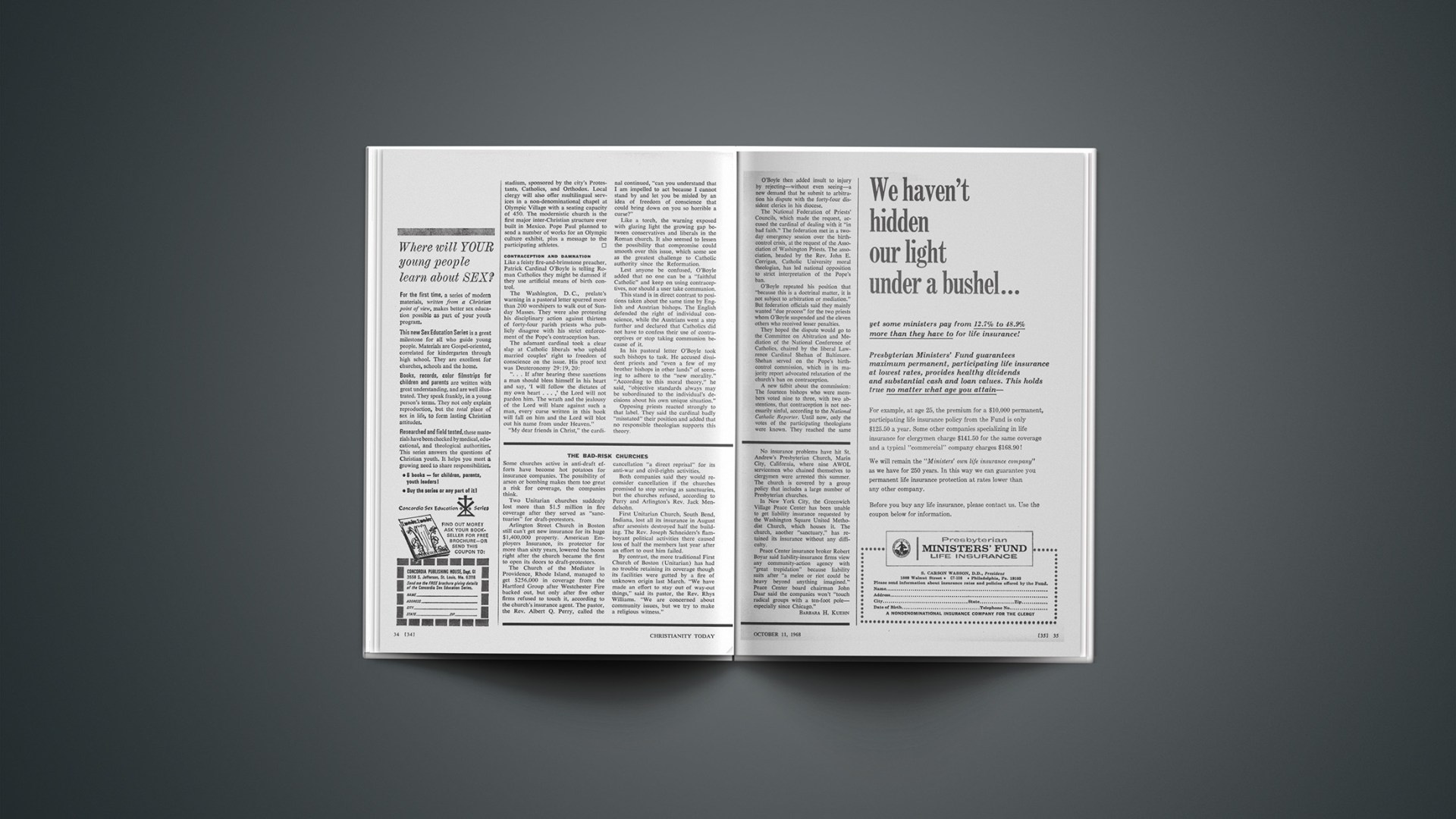Some churches active in anti-draft efforts have become hot potatoes for insurance companies. The possibility of arson or bombing makes them too great a risk for coverage, the companies think.
Two Unitarian churches suddenly lost more than $1.5 million in fire coverage after they served as “sanctuaries” for draft-protestors.
Arlington Street Church in Boston still can’t get new insurance for its huge $1,400,000 property. American Employers Insurance, its protector for more than sixty years, lowered the boom right after the church became the first to open its doors to draft-protestors.
The Church of the Mediator in Providence, Rhode Island, managed to get $256,000 in coverage from the Hartford Group after Westchester Fire backed out, but only after five other firms refused to touch it, according to the church’s insurance agent. The pastor, the Rev. Albert Q. Perry, called the cancellation “a direct reprisal” for its anti-war and civil-rights activities.
Both companies said they would reconsider cancellation if the churches promised to stop serving as sanctuaries, but the churches refused, according to Perry and Arlington’s Rev. Jack Mendelsohn.
First Unitarian Church, South Bend, Indiana, lost all its insurance in August after arsonists destroyed half the building. The Rev. Joseph Schneiders’s flamboyant political activities there caused loss of half the members last year after an effort to oust him failed.
By contrast, the more traditional First Church of Boston (Unitarian) has had no trouble retaining its coverage though its facilities were gutted by a fire of unknown origin last March. “We have made an effort to stay outl of way-out things,” said its pastor, the Rev. Rhys Williams. “We are concerned about community issues, but we try to make a religious witness.”
No insurance problems have hit St. Andrew’s Presbyterian Church, Marin City, California, where nine AWOL servicemen who chained themselves to clergymen were arrested this summer. The church is covered by a group policy that includes a large number of Presbyterian churches.
In New York City, the Greenwich Village Peace Center has been unable to get liability insurance requested by the Washington Square United Methodist Church, which houses it. The church, another “sanctuary,” has retained its insurance without any difficulty.
Peace Center insurance broker Robert Boyar said liability-insurance firms view any community-action agency with “great trepidation” because liability suits after “a melee or riot could be heavy beyond anything imagined.” Peace Center board chairman John Daar said the companies won’t “touch radical groups with a ten-foot poleespecially since Chicago.”
BARBARA H. KUEHN
A BLOW AT APARTHEID
The South Mrican Council of Churches issued the strongest religious attack yet against the nation’s racial separation policies. The 2,500-word document was signed by representatives of Anglican, Presbyterian, Lutheran, Methodist, and Baptist churches, plus non-official signers from two Dutch Reformed bodies and the Roman Catholic Church.
The churchmen argue that apartheid is “a demonstration of unbelief in the power of the Gospel,” which shows that “God’s grace has overcome our hostilities.” Apartheid “rejects as undesirable the reconciliation which God gives us through His Son. It reinforces distinctions which the Holy Spirit calls on God’s people to overcome. It calls good ‘evil’ ”.…
“Christians betray their calling if they give highest loyalty, which is due to God alone, to one group or tradition, especially where that group demands self-expression at the expense of other groups. Christ is inevitably a threat to much that is called ‘the South Mrican way of life.’ ”
The churchmen asked all Christians to ponder whether their first loyalty is to an ethnic group, a political idea, or Christ. It noted “increasing rigidity” in apartheid, which many see as “a necessary and permanent expression of the will of God.”










